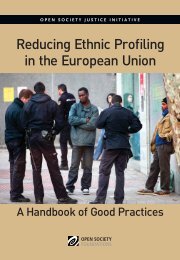individual communication to the united nations ... - Community Law
individual communication to the united nations ... - Community Law
individual communication to the united nations ... - Community Law
You also want an ePaper? Increase the reach of your titles
YUMPU automatically turns print PDFs into web optimized ePapers that Google loves.
27(4) <strong>the</strong> tenant lets <strong>the</strong> landlord in peacefully, and <strong>the</strong>n <strong>the</strong> landlord forces <strong>the</strong>tenant out; or (5) <strong>the</strong> landlord padlocks <strong>the</strong> door or changes <strong>the</strong> locks; or (6)<strong>the</strong> landlord shuts off <strong>the</strong> electricity or gas, or has <strong>the</strong>m shut off, in order <strong>to</strong>make <strong>the</strong> tenant leave; or (7) <strong>the</strong> landlord tries anything else <strong>to</strong> get <strong>the</strong> tenan<strong>to</strong>ut.The only way <strong>the</strong> landlord can evict <strong>the</strong> tenant is if a special court officer witha legal court order called a warrant for removal carries out <strong>the</strong> eviction. Andeven before <strong>the</strong> special court officer can do so, s/he must give a copy of <strong>the</strong>warrant for removal <strong>to</strong> <strong>the</strong> tenant (or leave a copy on <strong>the</strong> tenant‟s door) at leastthree days before <strong>the</strong> planned eviction. The new law provides that <strong>the</strong> warrantfor removal must tell <strong>the</strong> tenant many things, including that self-help evictionsby landlords are now disorderly persons offenses. The warrant must also let<strong>the</strong> tenant know <strong>the</strong> earliest day on which <strong>the</strong> special court officer can comeback <strong>to</strong> carry out <strong>the</strong> eviction.If a special court officer does perform a legal eviction, he or she must fill out anew form called an “execution of warrant for possession.” The new form mustsay when <strong>the</strong> legal eviction <strong>to</strong>ok place, and give <strong>the</strong> name, signature, andposition of <strong>the</strong> special court officer who performed <strong>the</strong> eviction. The specialcourt officer is required <strong>to</strong> immediately give a copy of this new form <strong>to</strong> both<strong>the</strong> landlord and <strong>the</strong> tenant (or a member of <strong>the</strong> tenant‟s family), and also <strong>to</strong>post it on <strong>the</strong> door of <strong>the</strong> dwelling unit.This last part is very important. It makes <strong>the</strong> job of <strong>the</strong> police officer who iscalled by a frightened tenant very easy. If <strong>the</strong> landlord does not have a copy ofa valid execution of warrant filled out by a special court officer, <strong>the</strong>n <strong>the</strong>landlord is performing an unlawful eviction. The police officer must tell him<strong>to</strong> s<strong>to</strong>p trying <strong>to</strong> evict <strong>the</strong> tenant. If <strong>the</strong> landlord does not s<strong>to</strong>p, <strong>the</strong>n <strong>the</strong> policeofficer must s<strong>to</strong>p <strong>the</strong> landlord and charge him with a disorderly personsoffense. The police officer must also protect <strong>the</strong> tenant and see that <strong>the</strong> tenantgets back in<strong>to</strong> <strong>the</strong> home.The new law says that <strong>the</strong> At<strong>to</strong>rney General of New Jersey must make surethat all state and local police officers, prosecu<strong>to</strong>rs, and public officials knowabout <strong>the</strong> new law. Each police officer must be given a form that describes <strong>the</strong>new law and <strong>the</strong> police officer‟s responsibilities <strong>to</strong> enforce it. Police officersmust also be given special training <strong>to</strong> make sure <strong>the</strong>y know what <strong>the</strong>y have <strong>to</strong>do <strong>to</strong> s<strong>to</strong>p illegal evictions.South AfricaUnder <strong>the</strong> Extension of Security of Tenure Act (62 of 1997), South Africa has made itan offence <strong>to</strong> evict a tenant without a court order. A conviction under this offence canlead <strong>to</strong> a fine, up <strong>to</strong> two years in prison or both.Ashling Gandy v Australia, Individual Communication <strong>to</strong> <strong>the</strong> Human Rights Committee
















